[Horus Heresy 10] - Tales of Heresy Read online
Page 6
Halvdan and Jurgen shared a brief look and shook their heads in disgust. Bulveye studied the Tyrants for a long moment, then stepped forwards, his axe held loosely in his right hand. He towered over the kneeling men like a vengeful god, glaring coldly at each man in turn.
“And so we meet again,” the Wolf Lord said, “just as I told you we would, seven years ago. Back then, I stood in your palace of crystal and steel and brought you glad tidings from our Allfather, the Emperor of Mankind. I bore a message of welcome, and promises of peace and order. I gave you this-” Bulveye said, holding out his open left hand—“and you spat upon my palm. You scorned the gifts of my lord and sent me into the streets like a beggar, threatening to kill me if we met again.”
The Wolf Lord glowered at the Tyrants and showed them his axe. “Before I left, I swore to you that this day would come. Now your fleets have been broken and your armies scattered.” Bulveye gestured eastwards. “Your palace of steel and crystal is no more. Your sons are dead, and your cities lie in ruins.” His voice lowered to a throaty growl, and his lips drew back in a snarl, revealing prominent, wolf-like canines. “You are Tyrants no longer. You have been cast down, and I’ve seen to it that neither you nor your kind will ever rise again.”
Bulveye gestured to his lieutenants. Halvdan and Jurgen stepped forwards, their expressions grim. Groans went up from the fallen Tyrants, and their wives cried out in misery. But instead of drawing their blades, the two Space Wolves took the chains of state from the trembling men and tossed them onto the treasure-pile, then grabbed hold of their rich robes and tore them away as well.
“Had it been left up to me, you would have never emerged from those tunnels,” Bulveye snarled. “I would have turned this entire mountain into your tomb. But the Allfather in his wisdom has decided otherwise.” The Wolf Lord gestured to the heaps of treasure. “This wealth belongs to the many worlds you have despoiled—planets that became battlefields thanks to your arrogance and greed. You will use this fortune to begin rebuilding what was lost, and ensure that the worlds of this subsector become prosperous and stable members of the Imperium. Each planet will soon have an Imperial governor to oversee their reconstruction, and they will send me regular reports of your efforts.” He glared down at the naked and shivering men. “Do not give me reason to return here ever again.”
Slowly and deliberately, Bulveye lowered his axe. The former Tyrants and their families fell silent, unable to contemplate at first that their lives and their virtue were to be spared. The Wolf Lord turned on his heel and strode back towards the waiting Stormbird. As he picked his way through the treasure trove he gazed sternly at the kneeling slaves. “Get up,” he commanded. “You are slaves no longer. From this day forwards, you are citizens of the Imperium, and so long as the Allfather lives, you will never bow your knee to another master.”
For the first time, a hint of life returned to the beleaguered faces of the former servants, and slowly, tentatively, they started to climb to their feet. Among the nobles, one young woman let out a hysterical cry of relief and half-crawled, half-stumbled to the side of her father, who tried to cover his nakedness with trembling hands and stared hatefully at the repeating backs of the Space Wolves.
The three warriors passed through the cordon established by their waiting battle-brothers and continued on to the Stormbird’s ramp. Halvdan stole a look behind him at the fallen Tyrants and growled deep in his throat. “We should have killed every last one of them,” he grumbled. “They won’t learn. You can be sure of that. In another ten or twenty years we’ll have to come back here and finish the job.”
But Jurgen shook his head. “The Lammas subsector will still be a shadow of its former self a hundred years from now, much less twenty,” he replied. “We were very thorough, brother. Every city, every industrial centre, every starport will have to be rebuilt.”
“A damned waste,” the Wolf Lord murmured, surprising both men. “So much destruction. So many lives thrown away, all for the sake of six arrogant fools.”
Halvdan shrugged. “Such is the price of resistance. It’s ever been thus, my lord, even back in the old days on Fenris. How many petty kings did we lay low at the command of King Leman? How many villages burned, how many longboats smashed to kindling? It’s the way of things. Empires are built with broken bones and rivers of blood.”
“Aye, that’s so,” Bulveye agreed. “I don’t deny it. And the Allfather’s cause is a just one: mankind must be made whole again if we’re to reclaim what is rightfully ours. This galaxy belongs to us, and it’s our duty to reclaim it, regardless of the cost. Otherwise, everything humanity has suffered up to this point will have been for naught.”
“And we’d be no better than all the xenos filth that came before us,” Jurgen added. He clapped Bulveye on the shoulder. “It’s been a long hard-fought campaign, my lord. You’ve broken the Tyrants and reclaimed the entirety of the Lammas subsector. Take pride in the knowledge that you’ve fulfilled your oaths to the Allfather, and be content.”
Just then, a wiry, older man wearing the dark grey tunic of a Legion bondsman descended the drop-ship’s ramp and hurried to meet the oncoming Wolf Lord. He was Johann, one of Bulveye’s own huscarls, and the Wolf Lord frowned at the tense expression on the bondsman’s face.
“What’s happened?” he asked quietly as Johann drew near.
“Two ships arrived in system a few hours ago,” the huscarl said gravely. “One was a courier, bearing a priority message from Leman Russ himself. We’re to conclude all operations immediately and rendezvous with the primarch at Telkara in five months’ time.”
The Wolf Lord’s eyes widened. “The entire company?”
Johann shook his head. “No, lord. The entire Legion. Orders have reached the primarch from the Allfather himself. We’re bound for Prospero.”
“Prospero?” Halvdan interjected. “That’s madness! Where did you hear such a thing?”
“It says so in the message,” the huscarl replied. “Though no reason is given. No doubt we will learn more when we reach Telkara.”
“Five months,” Jurgen echoed. He shook his head. “We’ve got warriors and ships scattered all over the subsector, hunting down the last of the Tyrants’ supporters. It could take months just to assemble everyone and see that they’re supplied for the journey.”
Bulveye nodded. Telkara was far to the galactic north, more than two sectors away. Withdrawing the company from combat and preparing them for such a trip was no small task. “Despatch couriers with orders for the company to marshal at Kernunnos at once,” he said to Johann. With much of the Imperial fleet orbiting the Tyrants’ former throne world, it would be the logical place to resupply the ships of the Great Company before they made way for Telkara. The Wolf Lord paused. “One moment. You said two ships arrived in system. What was the other one?”
“One of the long-range scout ships, my lord,” Johann replied. “You instructed Admiral Jandine to continue probing the region along the eastern edge of the subsector.”
“I know what I instructed Admiral Jandine,” Bulveye snapped. “Did they find anything?”
“Yes, lord,” the huscarl said. “The scouts report that the warp storms continue to diminish throughout the region, opening more and more of the area to safe navigation.” He started to say more, but hesitated.
The Wolf Lord’s eyes narrowed. “What else?”
“One of the ships managed to reach a star system in the region, one previously cut off by the storms,” he said. “It’s listed on our older charts, though there’s no indication that a colony was ever established there.”
“But?”
Johann took a deep breath and plunged ahead. “But the scout ship detected vox transmissions at standard frequencies emanating from the fourth planet in the system,” the huscarl reported.
Bulveye’s expression darkened. Halvdan shot a sidelong glance at Jurgen and shook his head. “Leave it,” he said to the Wolf Lord. “It’s just one world. Let the Army have a look.
We’ve got new orders, haven’t we?”
“Halvdan is right, my lord,” Jurgen added. “We’ve reclaimed every settled world in this subsector. What more can we do?”
Bulveye was silent for a moment more. “What more? Our duty to mankind, of course,” he said, then focused his attention on the huscarl.
“Tell me of this world,” the Wolf Lord commanded.
The battle-barge Ironwolf hung like a poised blade above the green-and-ochre surface of the battered world. Light from the system’s distant yellow sun glinted coldly on the warship’s cathedral-like superstructure and highlighted the raw battle-scars along its armoured hide. The Ironwolf had seen hard fighting in the last seven years of the Great Crusade, and the great battle-barge bore its wounds proudly. She was the flagship of the 954th Expeditionary Fleet, and her honour rolls bore testament to the battles she’d fought and the wayward worlds she’d reclaimed in the name of the Emperor of Man.
Bulveye felt the leaden weight of acceleration press his armoured form against its restraining cradle as the Stormbird flared its engines and launched from one of the Ironwolf’s cavernous launch bays. The thunder of the assault ship’s massive engines deadened abruptly as the Stormbird streaked across the gleaming curve of the planet’s upper stratosphere and began a gradual descent towards the surface. A hololith installed in the bulkhead in front of the Wolf Lord’s acceleration cradle displayed the Stormbird’s trajectory, along with status icons detailing everything from the craft’s airspeed and angle of attack to its weapons’ status, fuel consumption and turbine pressure. Interfacing with the Stormbird’s onboard systems via his armour’s vox-unit, Bulveye called up the high-altitude reconnaissance images taken of the planet over the past twenty-four hours and began to study the picts with a steely blue-eyed stare.
The planet had no name, according to the Ironwolf’s star charts; given their position, far to the galactic south, it had likely been one of the last human colonies, settled sometime in the Eighth Diaspora prior to the Age of Strife. The colonists had been very lucky, or very brave, or both, Bulveye reckoned. Few such colonies had survived the centuries of isolation that had followed; the Lammas subsector alone was strewn with the skeletal ruins of settlements that hadn’t been strong enough to endure the warp storms and the horrors they spawned.
And this world had suffered greatly, the Wolf Lord saw. Much of its landmass was barren and lifeless. Thousands of kilometres of wasteland stretched all the way to the planet’s polar ice caps, leaving perhaps a score of green and vibrant regions strung like a chain of emeralds around the world’s equator. He could see the outlines of great lakes and inland seas that had been transformed into cracked and broken plains, and broad mountain slopes scoured down to bare, unyielding stone. According to the auspex arrays aboard the Ironwolf, much of the lifeless terrain was dangerously radioactive.
Bulveye froze the pict-feed on a single image. “Magnify by ten,” he murmured into his vox-bead. The pict blurred as it expanded; cogitators in the base of the hololith clattered as the enhancement algorithms refined the smear of tan, ochre and dark grey into low, rounded hills surrounding a gently sloping basin some eighty kilometres across. The grey line of a dry riverbed wound like a serpent’s track across the centre of the basin, its borders smudged in places by drifts of choking dust. A broad expanse of broken stone and jagged, black girders rose from the dust along one broad bend of the riverbank. A small city had thrived there once, hundreds of years past.
Metal and military-grade plas creaked loudly behind the Wolf Lord. “Must’ve been quite a war,” Halvdan said admiringly, squinting at the pict over Bulveye’s shoulder.
Bulveye reached down and disengaged the swivel lock on his acceleration cradle so he could turn to face the interior of the transport’s forward troop compartment. A dozen Marines of his Wolf Guard filled the cramped space, locked into their own cradles along the chamber’s outer bulkheads. Their wargear had been cleaned of the grit and gore from the fighting on Kernunnos, and their armour polished to a mirror sheen. It was a small honour guard for so important a mission, but the Wolf Lord had been loath to withdraw any more warriors from vital combat duties on the Tyrants’ former throne world. Time was short, and Bulveye was resolved to make do with the men he had available. The Allfather expected no less of his Legions.
The Wolf Lord considered the hololith a moment more, then shook his head dubiously. “If it was a war, it was a damned strange one,” he replied. He indicated the lifeless plains outside the ruined city. “No craters. No ruined vehicles. No signs of abandoned fortifications or other field positions. And the devastation extends for thousands of kilometres, into northern and southern latitudes that would have been hostile to human life under normal conditions, much less something like this.”
Halvdan’s expression darkened. “Psykers, then,” he grumbled, reaching up to finger an iron charm hung from a leather cord about his thick neck. Psykers—more commonly called warlocks by the primitive folk on Fenris—had spontaneously emerged on countless human worlds just before the Age of Strife. Their unnatural powers caused widespread chaos and destruction; the most powerful psykers could warp the very fabric of reality itself. More than once during the course of the Crusade, the Expeditionary Fleets had come upon colonies that had fallen under the sway of these nightmarish beings. The Allfather had ordered the planets burnt to ash and the coordinates of the systems stricken from the star charts.
“Perhaps,” Bulveye allowed, “but if so, the people here must have found a way to stop them.”
Across the troop compartment, Jurgen shifted in his acceleration cradle to get a better view of the hololith. “I’ve yet to see a psyker survive an atomic blast,” he muttered. “It would explain all that radiation, and the scale of the devastation. They nuked three-quarters of their own planet to wipe them out.”
“Except that we’ve seen no indication of any military forces at all, much less atomic weapons,” Bulveye pointed out. “And then there’s this.”
The Wolf Lord turned back to the hololith and transmitted a command. The pict of the ruined city dissolved into a polychromatic fog. Cogitators whirred and clicked. Moments later another image resolved from the mist.
A city appeared in the foreground, built of solid slabs of glistening white stone and fitted cunningly into the slopes of forested hills at the base of a tall, cloud-swept mountain range. Streets made from stone or some local composite connected the terraced buildings and teemed with hundreds of people and small, dome-shaped vehicles going about their daily business. There was little in the way of detail, but something about the scene suggested frenetic—almost harried—activity.
Halvdan’s augmetic eye clicked softly as he focused on the image. “Seems pleasant enough,” he said.
“Not the city,” Bulveye said. He leaned against the restraints and jabbed a finger at a faint, dark object in the background of the image. “I’m talking about that.”
The Wolf Lord pointed to a thin, dark line, straight as a knife-edge and rising above the hills a long way away from the city. Halvdan scowled, peering intently at the image. “Well, it’s big, whatever it is,” he said.
“Big?” Jurgen echoed. “Judging by the scale, it must be huge.”
Bulveye nodded. The image vanished, replaced by another showing a closer look at the object. It was a spire, narrower at the tips and bulging slightly in the middle, like a dart balanced precariously on the palm of a man’s hand. The surface was a matt black, so dark it seemed to swallow the light around it. Only vague irregularities in the spire’s silhouette suggested that it wasn’t perfectly smooth, but possessed hundreds of small ledges and narrow alcoves.
“It’s more than five thousand metres high,” the Wolf Lord declared. “No one on the Ironwolf can tell me how old it is, or what it’s made of. About the only thing the Iron Priests can agree on was that no human hand could possibly have made it. And there’s one like it in each of the twenty habitable zones left on the planet.”
&n
bsp; Jurgen scowled at the strange image. “And you’re certain there aren’t any psykers down there?”
“Any psyker arrogant enough to build something like that isn’t the sort to hide in the shadows,” Bulveye countered. “Our recon flights intercepted a large number of civilian vox transmissions over the last few days—news broadcasts and the like. There’s no hint of psyker activity anywhere on the planet.”
“And yet,” Halvdan said, stroking the charm around his neck, “the spires are only found in close proximity to people. That can’t be a coincidence.”
“My thoughts exactly,” Bulveye agreed. “Needless to say, I’ve got a number of questions for the Planetary Senate once we’ve finished with the important business of the day.”
“I don’t like this at all,” Jurgen grumbled. “And it’s not as though we’ve no more important work to do, my lord. The primarch has summoned us; why do we dally here?” He waved a gauntleted hand at the hololith. “This is a minor world on the very fringe of human space. As best we can tell, there’re perhaps a hundred and twenty million people on the entire planet: there were cities on Kernunnos that were larger than that! And that’s nothing compared to what awaits us at Prospero.”
Halvdan clenched his bearded jaw, but nodded as well. “For once, I agree with Jurgen,” he said. “Our destiny lies far to the galactic north. What is to be gained here, of all places?”
The Wolf Lord’s eyebrows rose at the question. “What is there to be gained? A hundred and twenty million lost souls to begin with,” he replied. “Not to mention the honour of our company! The primarch sent us here to bring the worlds of the subsector into compliance—all of them—and that’s exactly what I mean to do. It will take another eight weeks at least to marshal the rest of the company at Kernunnos; in the meantime, we have a job to perform.”
Jurgen did not reply at once. Instead, he studied his lord for several long moments. “My lord, you and I have fought together for almost three hundred years now,” he said. “I know you better than most men know their own brothers, and I can’t help but wonder if there’s more to this little expedition than simply fulfilling your duty.”

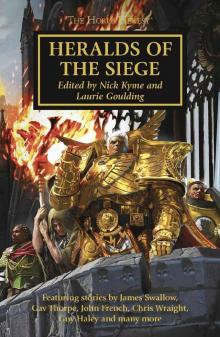 Heralds of the Siege
Heralds of the Siege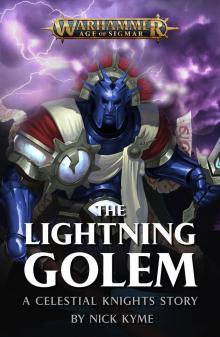 The Lightning Golem
The Lightning Golem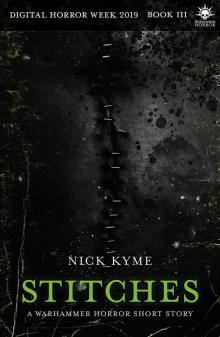 Stitches
Stitches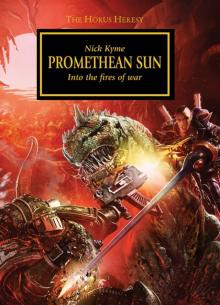 Promethean Sun
Promethean Sun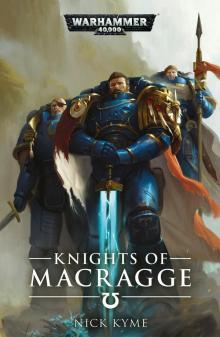 KNIGHTS OF MACRAGGE
KNIGHTS OF MACRAGGE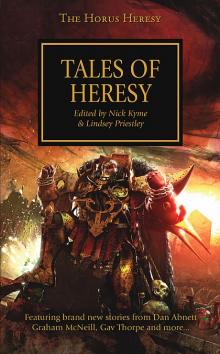 Tales of Heresy
Tales of Heresy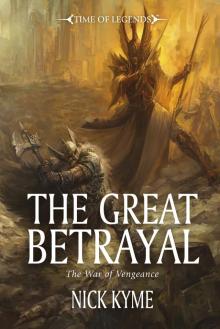 The Great Betrayal
The Great Betrayal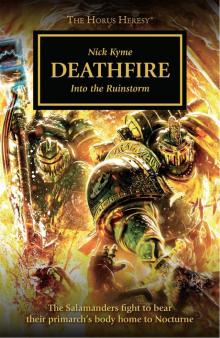 Deathfire
Deathfire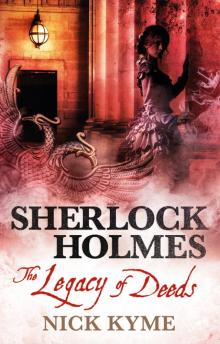 Sherlock Holmes--The Legacy of Deeds
Sherlock Holmes--The Legacy of Deeds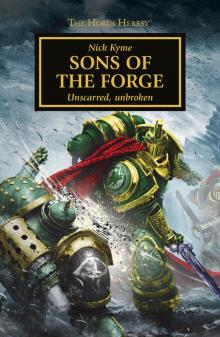 Sons of the Forge
Sons of the Forge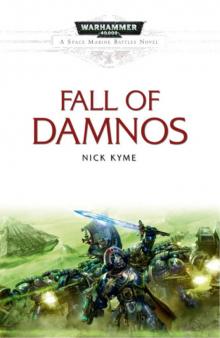 Fall of Damnos
Fall of Damnos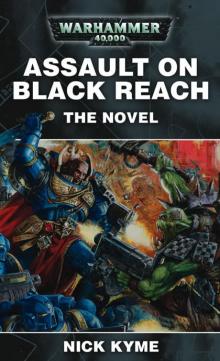 Assault on Black Reach: The Novel
Assault on Black Reach: The Novel![[Horus Heresy 10] - Tales of Heresy Read online](http://i1.bookreadfree.com/i/03/27/horus_heresy_10_-_tales_of_heresy_preview.jpg) [Horus Heresy 10] - Tales of Heresy
[Horus Heresy 10] - Tales of Heresy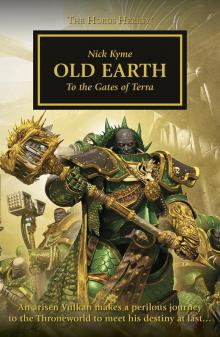 Old Earth
Old Earth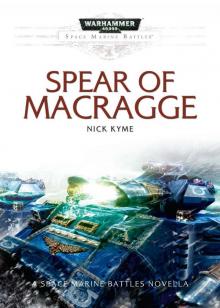 Spear of Macragge
Spear of Macragge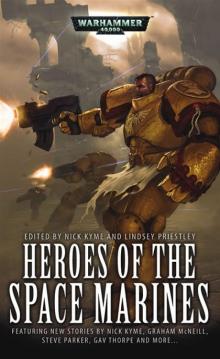 Heroes of the Space Marines
Heroes of the Space Marines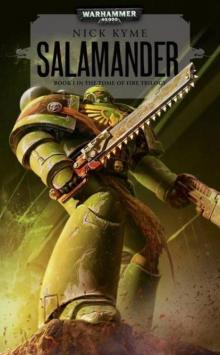 Salamander (warhammer 40000)
Salamander (warhammer 40000)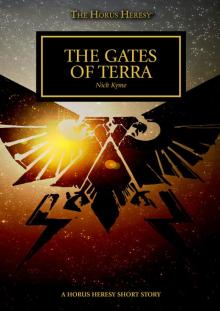 The Gates of Terra
The Gates of Terra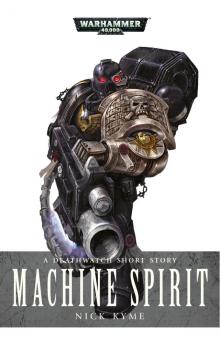 Machine Spirit
Machine Spirit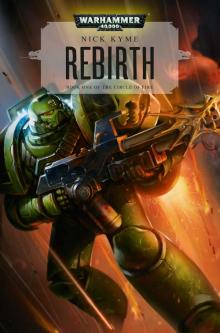 Salamanders: Rebirth
Salamanders: Rebirth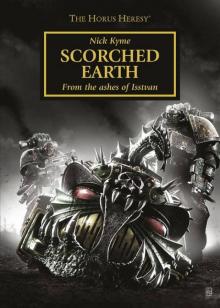 Scorched Earth
Scorched Earth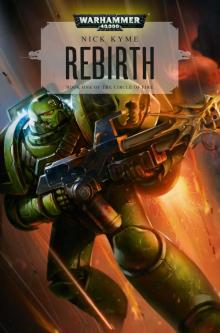 Rebirth
Rebirth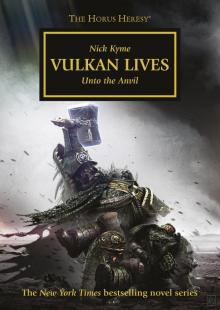 Vulkan Lives
Vulkan Lives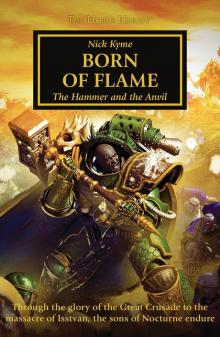 Born of Flame
Born of Flame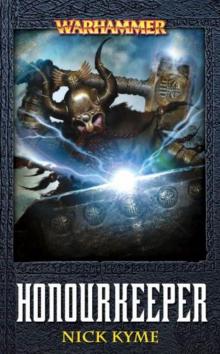 Honourkeeper
Honourkeeper